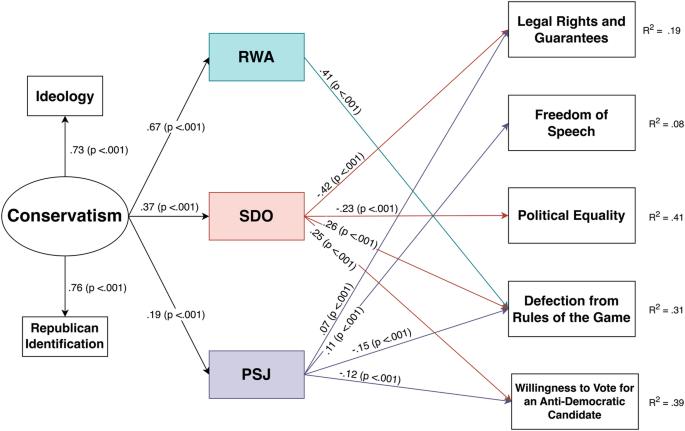Liberal-conservative asymmetries in anti-democratic tendencies are partly explained by psychological differences in a nationally representative U.S. sample
引用次数: 0
Abstract
Based on theory and research in political psychology, we hypothesized that liberal-conservative differences in right-wing authoritarianism, social dominance orientation, and political system justification would contribute to asymmetries in anti-democratic tendencies. These hypotheses were tested in a nationally representative survey of U.S. adults (N = 1557). Results revealed that conservatives were less supportive of political equality and legal rights and guarantees and more willing to defect from democratic “rules of the game” and vote for anti-democratic candidates, even after adjusting for political extremism. Mediational analyses suggested that conservatives’ anti-democratic tendencies were partially attributable to higher levels of right-wing authoritarianism and social dominance orientation. Conservatives also scored higher in political system justification, which was associated with support for free speech and mitigated anti-democratic tendencies. Democrats and Republicans who approved January 6, 2021, insurrectionists were more conservative and higher in right-wing authoritarianism than those who did not. Implications for social psychology and society are discussed. In a nationally representative survey in the United States, conservatives were less supportive of democratic norms such as political equality and legal rights and guarantees as compared to liberals. These associations were partially mediated by higher levels of right-wing authoritarianism and social dominance orientation.

在具有全国代表性的美国样本中,自由派与保守派反民主倾向的不对称在一定程度上是由心理差异造成的
基于政治心理学的理论和研究,我们假设自由派和保守派在右翼专制主义、社会主导取向和政治制度正当性方面的差异会导致反民主倾向的不对称性。这些假设在一项具有全国代表性的美国成年人调查(N = 1557)中得到了验证。结果显示,保守派对政治平等、法律权利和保障的支持度较低,更愿意背离民主的 "游戏规则 "并投票给反民主的候选人,即使在对政治极端主义进行调整后也是如此。中介分析表明,保守派的反民主倾向部分归因于较高程度的右翼专制主义和社会主导倾向。保守派在政治制度合理性方面的得分也较高,这与支持言论自由和减轻反民主倾向有关。与不赞成 2021 年 1 月 6 日叛乱的人相比,赞成 2021 年 1 月 6 日叛乱的民主党人和共和党人更加保守,右翼专制主义程度更高。讨论了对社会心理学和社会的影响。在美国一项具有全国代表性的调查中,与自由派相比,保守派对政治平等、法律权利和保障等民主规范的支持程度较低。这些关联部分是由更高程度的右翼专制主义和社会支配取向所促成的。
本文章由计算机程序翻译,如有差异,请以英文原文为准。
求助全文
约1分钟内获得全文
求助全文

 求助内容:
求助内容: 应助结果提醒方式:
应助结果提醒方式:


